Related Research Articles

The National Broadcasting Company (NBC) is an American commercial broadcast television and radio network serving as the flagship property of the NBC Entertainment division of NBCUniversal, a subsidiary of Comcast. Headquartered at the Comcast Building in New York City, NBC also has offices in Los Angeles at 10 Universal City Plaza and in Chicago at the NBC Tower.

Josephine Owaissa Cottle, known professionally as Gale Storm, was an American actress and singer. After a film career from 1940 to 1952, she starred in two popular television programs of the 1950s, My Little Margie and The Gale Storm Show. Six of her songs were top ten hits. Storm's greatest recording success was a cover version of "I Hear You Knockin'," which hit No. 2 on the Billboard Hot 100 chart in 1955.
The year 1953 in television involved some significant events. Below is a list of television-related events during 1953.

Lights Out is an American old-time radio program devoted mostly to horror and the supernatural.
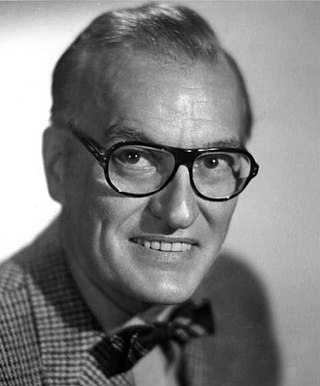
David Cunningham Garroway was an American television personality. He was the founding host and anchor of NBC's Today from 1952 to 1961. His easygoing and relaxing style belied a lifelong battle with depression. Garroway has been honored for his contributions to radio and television with a star for each on the Hollywood Walk of Fame and the St. Louis Walk of Fame, the city where he spent part of his teenaged years and early adulthood.

Kathryn Elizabeth Smith was an American contralto. Referred to as The First Lady of Radio, Smith is well known for her renditions of "God Bless America" and "When the Moon Comes over the Mountain". She became known as The Songbird of the South because of her tremendous popularity during World War II.

WSCR – branded as 670 The Score – is a commercial sports radio station licensed to serve Chicago, Illinois, the Chicago metropolitan area and much of surrounding Northern Illinois, Northwest Indiana and parts of the Milwaukee metropolitan area. Owned by Audacy, Inc., WSCR is a clear-channel station with extended nighttime range in most of the Central United States and part of the Eastern United States. WSCR is the Chicago affiliate for the BetQL Network, CBS Sports Radio, the Fighting Illini Sports Network and the NFL on Westwood One Sports; the flagship station for the Chicago Cubs and Chicago Bulls radio networks; and the home of radio personalities David Haugh and Matt Spiegel.
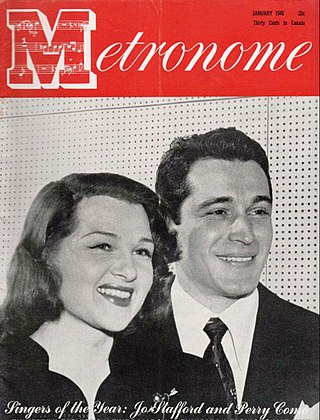
The Chesterfield Supper Club is an NBC Radio musical variety program (1944–1950), which was also telecast by NBC Television (1948–1950).
Ford Theatre, spelled Ford Theater for the original radio version and known, in full, as The Ford Television Theatre for the TV version, is a radio and television anthology series broadcast in the United States in the 1940s and 1950s. At various times the television series appeared on all three major television networks, while the radio version was broadcast on two separate networks and on two separate coasts. Ford Theatre was named for its sponsor, the Ford Motor Company, which had an earlier success with its concert music series, The Ford Sunday Evening Hour (1934–42).

Ben Gage was an American radio singer and announcer, occasional off-screen film singer dubbing the voice of non-singing actors, and television actor active from 1937 to 1975. Born in Chicago, Illinois, his first wife was Esther Williams.
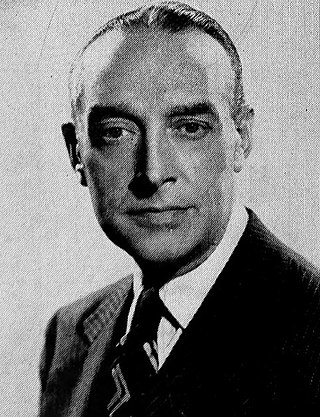
Frank Gallop was an American radio and television personality.

James Clarence Wakely was an American actor, songwriter, country music vocalist, and one of the last singing cowboys. During the 1930s, 1940s and 1950s, he released records, appeared in several B-Western movies with most of the major studios, appeared on radio and television and even had his own series of comic books. His duet singles with Margaret Whiting from 1949 until 1951, produced a string of top seven hits, including 1949's number one hit on the US country chart and pop music chart, "Slippin' Around". Wakely owned two music publishing companies in later years, and performed at the Grand Ole Opry until shortly before his death.
Campus Hoopla is an American game show that ran on the NBC Television network from December 27, 1946, until it ended on December 12, 1947.
Mary Small was a prominent singing personality during the Golden Age of Radio and hosted her own broadcasts for 14 consecutive years across all major networks. She headlined or opened at "presentation houses" from the 1930s through the 1950s including the Paramount Theater, Madison Square Garden, the London Palladium, the Copacabana with Sammy Davis, Jr., and the Palace Theater in Chicago.
Highway to the Stars was an early American live television soap opera, which was broadcast on New York City station WABD, flagship station of the DuMont Television Network, from August to October 1947, at which point it was replaced with Look Upon a Star, itself eventually replaced with Camera Headlines in January 1948.
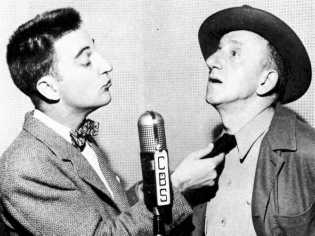
The Durante-Moore Show was an old-time radio show that ran on NBC with episodes running from March 25, 1943–October 28, 1943 and on CBS with episodes running from October 8, 1943–June 27, 1947.

Eugenie Baird was an American big-band, jazz, and radio singer.
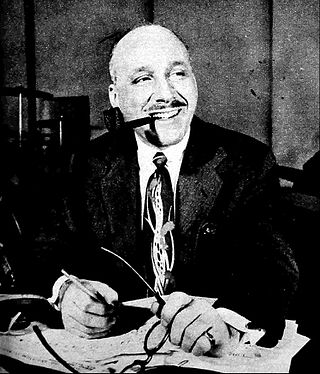
Raymond Arthur Bloch was an American composer, songwriter, conductor, pianist, author and arranger. He is best remembered as the arranger and orchestra conductor for The Ed Sullivan Show during its entire run from 1948 to 1971.
NBC television's relationship with Major League Baseball technically dates back to August 26, 1939. It was on that particular date that on W2XBS, the first-ever Major League Baseball game was televised. With Red Barber announcing, the Brooklyn Dodgers and the Cincinnati Reds played a doubleheader at Ebbets Field. The Reds won the first game 5–2 while the Dodgers won the second, 6–1. Barber called the game without the benefit of a monitor and with only two cameras capturing the game. One camera was on Barber and the other was behind the plate. Barber had to guess from which light was on and where it pointed.
This is a list of American television-related events in 1945.
References
- 1 2 Steinhauser, Si (October 1, 1947). "Vox Pop Leads 'Horning In' on Bing's Night". The Pittsburgh Press. p. 36. Retrieved November 13, 2021– via Newspapers.com.
- 1 2 Schrader, Marty (October 6, 1945). "Reviews:NBC". Billboard. pp. 12–13. Retrieved November 13, 2021.
- ↑ "NBC's Record Wax Sale; KYW Hypoes Football Programming" (PDF). Billboard. September 28, 1946. p. 14. Retrieved November 13, 2021.